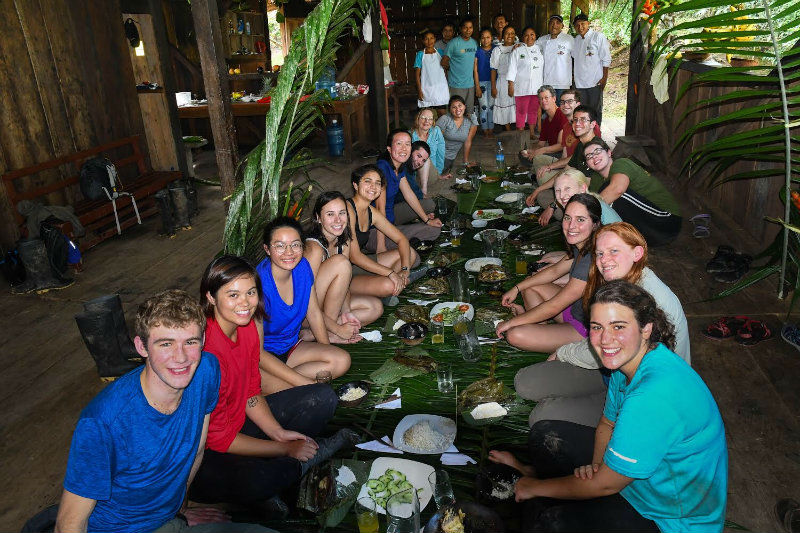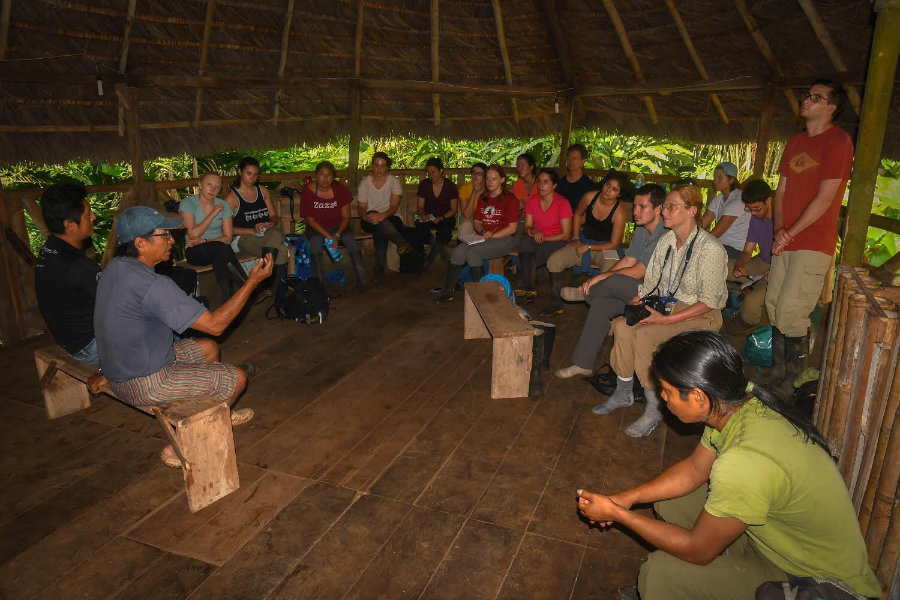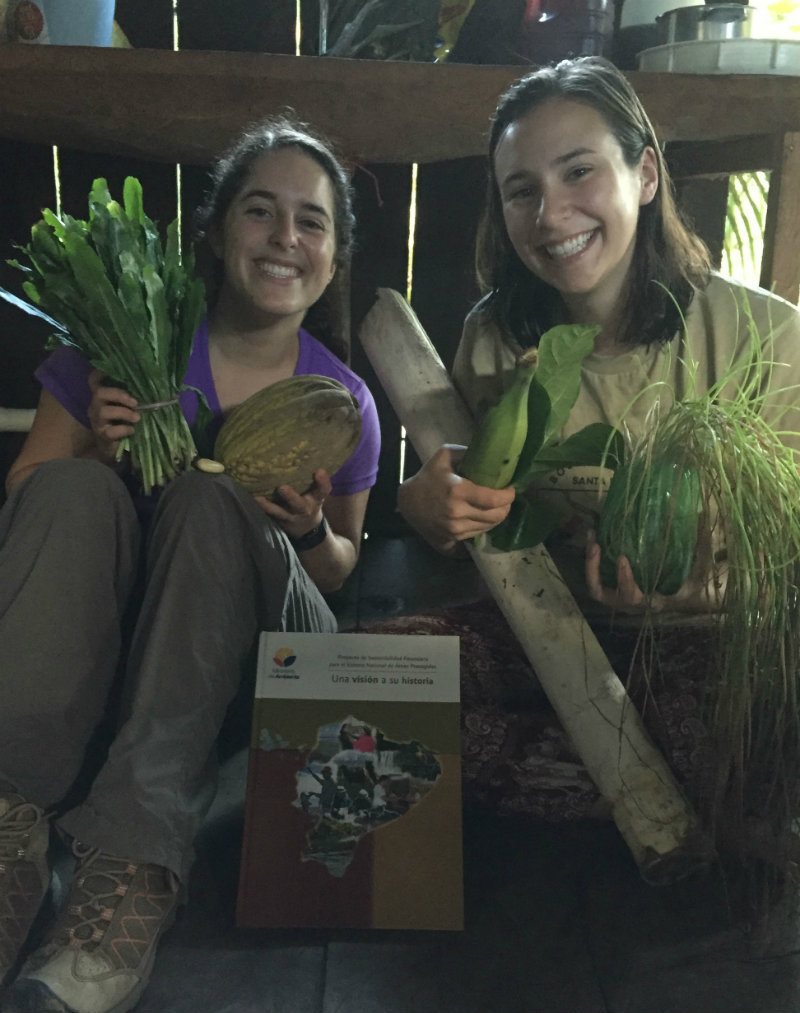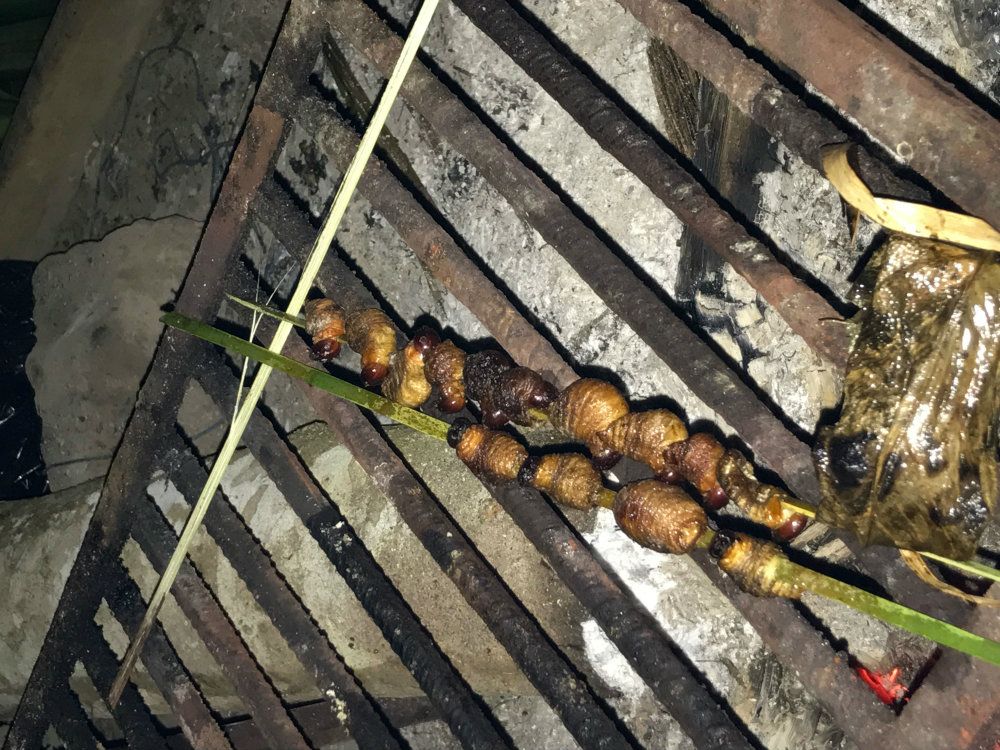
The shade provided by the high woven ceiling of the kitchen only did so much to relieve the heat during lunch as the open cooking fire in the center filled the room with more thick heat. My classmate Ali and I, filled with nerves and concern about intruding on the family’s time and space, approached the kitchen slowly. About a week into our trip, we were still unadjusted to the large maggots lining sticks like marshmallows cooking in the fire, and the loud bugs that swirled around our heads and covered our bodies in fiery red spots. I was only semi-proficient Spanish, we asked if we could help with meal preparation as we were eager to learn more about Quechua food culture. Alicia, in Spanish, also her second language, ushered us into the kitchen among the chorus of “Sí.”
Sitting down on the floor, she started pulling out curled roots, giant pods of seeds and bushy greens from baskets. Trying to keep up with her broken Spanish, we scribbled notes, asked a constant stream of questions and spoke to others who were able to rephrase when we were still left confused. On my left was another visiting woman, from the Sequoia tribe, grinding yucca into a fine paste. She would later dry the paste into a fine powder, like flour and make a tortilla analog. No water, no egg, nothing but the yucca powder. It was mystifying to watch.
Ali and I were visiting as a part of an educational trip in tropical Ecuador, traveling through remote parts of the Amazon, stopping at rustic ecolodges run by various community groups. Alicia’s community, known as the Saní Community, is from the Quechua tribe. The Quechua are a large ethnic group whose historical territory includes the Andean regions of Ecuador, Peru and Bolivia. And like many other indigenous communities, they have begun to welcome newcomers into their homes in an effort to find sustainable forms of income.
Oil runs thick and dark through Amazonian Ecuador, entangling locals who don’t have the language ability, education or economic opportunity to resist its destructiveness. Corrupt politicians, who sold billions of dollars in rights to mine to foreign corporations, have devastated the forest. With few job opportunities in the region, many young community members who don’t end up working in the oil industry leave to learn Spanish and receive some form of education. In the wake of oil companies’ devastation, many indigenous communities are swamped in processed foods, sugar and alcohol, causing a slew of health problems. But some communities are experimenting with ecolodges and ecotourism that offer income to indigenous people, preserve culture and incentivize them to protect the forest and rivers. Though ecotourism’s effectiveness is debated, it is an alternative to many destructive practices like big agriculture, logging and oil. And it provides the Saní community with a form of income that keeps the forest and river alive.
The Mandari Panga Lodge was started by Freddy, Alicia’s nephew. The Saní Community also has a communally owned lodge, known as Saní Lodge. But with rotating leadership every two years, Freddy struggled with the lack of continuity and long-term planning. Mandari Panga focuses on sustainable practices that reduce the footprint of tourists and fostering intercultural connections.

The Mandari Panga Lodge is named in honor of this smaller community of Quechua. The community had settled down in the Amazon basin along the Tiputini River, an offshoot of the Napo River, an area once inhabited by the Naporuna and Canelo tribes, attempting to flee persecution by the Huaorani, a tribe who only began contact with the outside world about 50 years ago. Yasuní National Park is still home to uncontacted people, the Tagaeri and Taromenane tribes, in what is known as the “intangible zone.” Tribal politics rule this land and conflict that arises between communities or with outsiders is rarely monitored by the Ecuadorian government.
Alicia served not just as the head of the kitchen, but one of the heads of the small community that has settled here. The other cooks orient themselves around her, seemingly expecting her approval or direction. Though her hands look well practiced at folding banana leaves, pinching the heads off maggots, and carving out seeds from the cacao blanco fruit, she does little work as she fills the room with her laughter and warmth.
Alicia, in her 30 years at Mandari Panga, can tell me what animals are more frequently spotted now that they have begun to actively protect the forest. Before starting their ecotourism business, an overwhelming lack of economic incentive led to degraded forests. They cleared plots for agriculture and killed a variety of mammals and birds, species of which many tourists would pay to big money to see, for food.
Alicia’s influence spans way beyond the banks of the Tiputini. She teaches women in neighboring tribal communities about cooking that utilizes more plants, and less meat. Traveling around Ecuador, she preaches how less meat is better for the forest, better for tourism, and therefore, better for their local economy. The seed of the cacao blanco, which looked like a hard, curled-up centipede when first served to me, is the ultimate meat replaced she boasts. She herself only eats fish. When we told her that in the U.S. we call people who only eat fish and no other meat “pescatarian,” she again filled the kitchen with laughter. Repeating it to herself under her breathe over and over, she kept laughing.
Beyond her travels around Ecuador, in 2015, Alicia went to Paris for COP 21, the United Nations Climate Change Conference. As part of a delegation not from Ecuador, but of indigenous groups in the Amazon, she shared her views of meat consumption, merging indigenous gastronomy with western palates, foraging form and intercropping in the forest and ecotourism. She sees ecotourism as a sustainable way of keeping not only the forest alive, but cultures, as the opportunity for income keeps young members in their community. More recently, Mandari Panga won an award from the British Guild of Travel Writers in the “Wider World” category.
Once the floor was full of wild garlic, yucca, banana leaves, cacao blanco, wild fruits and stalks of wild onion, Alicia arranged them around us for a picture. She’d look at us and smile and then forget something and pull out another foreign vegetable hanging from the ceiling or buried in a woven basket. The picture was finally taken once she was satisfied.

Her cooking is her culture. She honors her ancestors with techniques passed down for generations. She’s confident that the wild produce growing in the forest and in her small garden, used only indigenous cuisine, make her cooking better than other chefs. She cooks not just to feed the guests that come visit, but to teach her own family and community about cultural food. With the ever-looming presence of the oil industry, the western diet has been disastrous on indigenous health where it has been able to squeeze its way in. Diabetes, teeth decay and weight problems are just some of the health problems she prevents by reviving her cultural food.
When we turn the conversation to climate change and deforestation, Alicia points to direct examples of where she sees change. Crops they used to harvest wild from the forest show up later in the year or in sparse quantities. None have yet to disappear, but she shows concern that they might. To combat the? decline in foraged crops, they have begun to cultivate more in the small garden right outside the kitchen. Though climate change is exhibiting immense pressure on many Amazonian species, Alicia remains unwaveringly optimistic.
Mandari Panga boasts that every dollar spent at the lodge is a direct benefit to the local community. And so far, it appears to be money well spent. The forest occupied by Mandari Panga is untouched by oil, and they have strong incentive to continue keeping them out. Young people are still learning Quechua and Spanish, seeking more education, but most still return home. They’re able, for the most part, to keep their language, culture and forest while still operating in an increasingly global and capitalistic world.
Alicia’s firsthand experience with the benefits of preserving the forest is central to her teachings. From the presence of more foraged crops to the greater presence of howler monkeys, a coveted site by tourists, she is instilling the importance of cultural cooking and reduced meat consumption. The food she prepares, like crushed plantain patties, soup with a dense potato-like root and cacao blanco seeds, and piranha roasted in banana tree leaves, is still beaming with the life and history of her people, but her emphasis on eliminating hunting helps ecotourism in the region flourish. Ultimately, the sustainable income is keeping other parts of their culture alive, adjacent to the forest itself.

With a couple hours come and gone, we rejoined our group for lunch. But before we were allowed to leave, Alicia insisted we try the maggots, more accurately known as the chontacurro larvae that live in palm trees. They’re about the size of your thumb, and with eggshell colored bodies that convulse through the water like someone doing the wave at a baseball game. They are a delicacy in the Quechua community and are a symbolic cultural food. When eaten raw, we were informed that you must chew really thoroughly so as to fully kill it and not risk it crawling back up your throat. Knowing full well I was not up to the task, I opted for a fried one.
Nervously giggling and delaying the inevitable, I stated I hadn’t eaten meat in about 10 years. Alicia just laughed and promised me the larvae only ate vegetables, so they were vegetarian anyways. Unconvinced and with a little cheers, Ali and I took a bite of the crispy maggot. It tasted like bacon; oily bacon, but bacon nonetheless. The black head popped like a popcorn kernel in my mouth and after the last bite, we were officially invited to come back to the kitchen any time.
